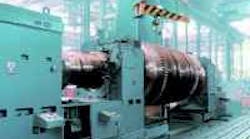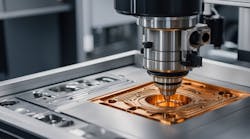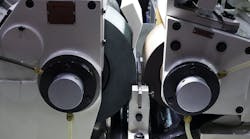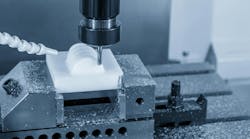The Czech Republic battles economic upheaval and comes out a winner.
The large Czech manufacturer Skoda Machine Tool concentrates on the production of heavy duty lathes, milling, and boring machines.
When the Berlin Wall came down in 1989, many former USSR countries suffered great economic hardship while assimilating into the world market. The Czech Republic, formerly part of Czechoslovakia, was able to adapt relatively quickly to economic changes, however. As the main supplier of industrial equipment to the USSR and Eastern Bloc countries, the Czech machine tool industry had great potential for overcoming the challenges of a free economy. Within a few short years, Czech manufacturers competed by offering affordable, quality, customized machines, while focusing on fast delivery and competent aftersales service.
But the road to successful production and export was not easily traveled. In addition to seeking out fresh markets while struggling with a new economic system, the Czechs were suffering from a developmental lag in machine tool technology that had taken root in the early 1960s. During the period when numerically controlled machine tools were being developed, the Iron Curtain was limiting the country's access to hydraulics and electronics technology. In 1989, the country immediately addressed the issue and started buying the most upto-date components. Once competent Czech engineers and designers had access to current controls, Czech machines were produced at a quality level and affordable price that matched the world's needs.
But after a long period of a communist economy, Czech producers had to relearn how to meet all the new demands of the modern customer, which included aftermarket service and JIT delivery of the machines and spare parts. They also quickly learned to meet the needs of machine tool customers that wanted the builder to solve technology problems, not just sell machines.
By 1994, the Czech industry met these challenges head on and became a significant force in the world machine tool market. Despite a certain slowdown of production in 1999 due to a recession in European and U.S. markets, the industry has grown significantly since the mid-1990s. According to The Czech Association of Machine Tool Producers (SST), the Czech Republic ranks 14th in the world and 7th in Europe in production volume with the total annual output of cutting and forming machines (including accessories, spare parts, and overhauls) totaling $283 million last year. The proportion of exports is 80 to 90% of the volume produced, and machines are bound predominately for Germany, Italy, the U.S., and now Belarus thanks to a recent large contract between the Czech company Alta and the Belorusian Belaz company. Czech machine tools can be found in companies such as Boeing, GEAE, British Aerospace, Rolls Royce, Saab, Volkswagen, and Wyman Gordon. Germany dominates the Czech Republic import market with $45.3 million worth of equipment sold last year, which is an increase of 7.5%. Other countries are making import headway, however, including Italy with $8.4 million, Switzerland with $6.8, and the UK with $6.9 — all increasing their exports into the Czech Republic by well over 25%.
The Czech Republic adapted well into the global economy in part because its manufacturers understood the importance of being active in European structures. The SST was the only national union from the post-communist countries to become a full member of the European Association of Machine Tool Producers (CECIMO) in Brussels.
In addition to helping its members become involved in European structures, the SST also united with the Association of Producers and Suppliers of Engineering Technology to revitalize Czech research and development in industry and universities.
Main efforts were directed to tailoring research projects to developments in the rest of the world. The country also successfully spearheaded 10 smaller projects.
One great success came with the presentation of the first Czech machine with linear drives for high-speed machining at the second International Exhibition of Machine Tools and Forming Machines in Brno. The machine, developed in cooperation of Tajmac-ZPS Zlin Co. and the Czech Technical University in Prague, has feedrates of 80 m/min, acceleration of 2 G, spindle speed of 15,000 rpm, and spindle output of 18 kW.
Current research efforts from the Research Center for Engineering Production Technology in-
Czech machine tool and forming machine figures In Millions of USD
Year 1999 Year 2000 Estimation Value Value % Trends
Production
Exports
Imports
217.4 228.2 5.0
223.1 234.3 5.0
197.6 197.6 0.0 App. Consumption 191.8 191.5 -0.1
Export Trends
Value
from mid 1999 to mid 2000 % Trends
Germany
Countries
46.1
11.7
21.2
19.5
4.6
3.5
3.4
-14.6
24.4
14.9
61.8
-9.1
26.5
14.9
Italy
USA
Belarus
Austria
Slovak Rep.
UK
CKD Blansko specializes in large vertical lathes equipped with 10,000-mm table diameters for loads of up to 450 tons.
CETOS, a joint-stock company established in Prague in 1856, manufactures the BK 140 CNC crankshaft grinder for grinding crank pins and crankshaft journals of monolithic crankshafts weighing up to 25,000 kg with a length of up to 12,500 millimeters.
centers up to about 1,000-kg table-load capacity. Tajmac-ZPS has a similar manufacturing program and also produces horizontal machining centers. TOS Kurim concentrates on systems designed for machining large, complex workpieces.
Many of the same main manufacturers produce drilling, boring, and milling machines, including Kovosvit and TOS Kurim. The Strojtos Lipnik plant produces a series of conventional and CNC knee-type milling machines designed for products up to 1,200 kg.
Skoda Machine Tool has also gained recognition for building three series of milling and boring machines. Like the other Skoda machines, these heavy-duty milling units can be customized with a comprehensive series of accessories, including double-axis swing heads. Another manufacturer of conventional and CNC knee-type milling machines is OSO (Obrabeci stroje) Olomouc.
TOS Varnsdorf has been specializing in horizontal boring machines since WWII. The company mainly produces horizontal, five-spindle NC boring machines, and all the machines are equipped with digital servomotors and the
latest control systems. Some even offer compact linear guides.
In the grinding field, producers include Erwin Junker and Cetos Hostivar. Erwin Junker supplies a wide range of conventional and CNC grinders. It also produces
Czech Republic Machine Tool Consumption in USD (2000 figures are estimates)
1994 1995 1996 1997 1998 1999 2000 (est) 113.6 126.1 140.6 160.3 230.7 191.9 191.5
Czech Republic Machine Tool Production in USD (2000 figures are estimates)
1994 1995 1996 1997 1998 1999 2000 (est) 104.6 127 171.6 204.3 241.3 217.4 228.2
Czech Republic Machine Tool Exports in USD (2000 figures are estimates)
1994 1995 1996 1997 1998 1999 2000 (est) 89.8 110 139.1 174.3 217.2 223.1 234.3
Czech Republic Machine Tool Imports in USD (2000 figures are estimates)
1994 1995 1996 1997 1998 1999 2000 (est) 97.7 109.1 108.2 130.3 206.6 197.6 197.6
centerless grinders, surface grinders, spline grinders, and tool sharpeners. Cetos, a joint-stock company in Prague was established in 1856 and now produces cylindrical grinding machines for external grinding. Cetos is a renowned producer of mainly medium but also small and heavy grinding machines.
Import Trends
Value Countries from mid 1999 to mid 2000 % Trends
Germany
45.3
7.5
Italy
8.4
38.3
Swiss
6.8
27.4
UK
6.9
63.6
Japan
4.5
-10.1









